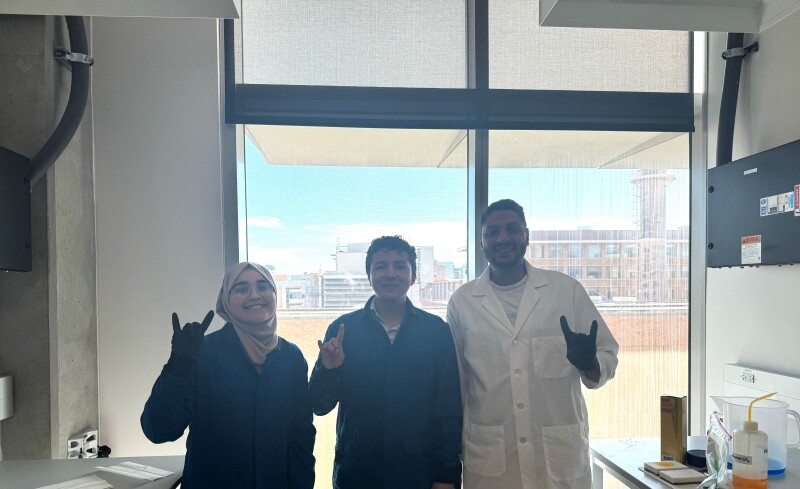The Petroleum Graduate Students Association (PGSA) at The University of Texas at Austin (UT Austin) celebrated the International Day of Women and Girls in Science by engaging K-8 students in a hands-on learning experience about CO2 injection and storage in porous rock. As part of STEM Girl Day 2025, an annual event hosted by Women in STEM that attracts over 10,000 students to campus, UT Austin students Nadia Mouedden and Deena Elhossary led the "Super Sponge and Magic Straw Experiment."
“I really enjoyed teaching children about our role as petroleum engineers in powering society responsibly and safely. It was a very rewarding experience to see how enthusiastic they were about engineering in general. As a female engineer, I aspire to become a successful role model that motivates and encourages young girls to pursue STEM fields,” said Elhossary.
This interactive demonstration highlighted the role of petroleum engineering in both economic development and environmental sustainability, emphasizing the industry’s efforts to reduce CO2 emissions.
The experiment was originally developed by UT Austin students Mouedden, Ibrahim Gomaa, and Alejandro Lopez, who won first place in the UT Department of Petroleum and Geosystems Engineering's “Simple Concepts Competition.” It was showcased at STEM Girl Day for the first time, with Mouedden and Elhossary leading the demonstration.
“Through our hands-on experiment, we highlighted how engineering plays a key role in balancing resource development with sustainability, emphasizing critical thinking, collaboration, and adaptability, skills that are essential for any future scientist or engineer,” shared Mouedden.
Using simple household materials like sponges, foam sheets, straws, baking soda, and vinegar, students created a mini-aquifer model to simulate underground CO2 storage. By perforating straws to represent wells and injecting CO2 through a baking soda and vinegar reaction, they observed how gas moved through porous rock and was trapped beneath an impermeable layer.
“The students loved the experiment and actively engaged with us throughout the event. We were amazed by how some young students already had background knowledge of petroleum engineering and eagerly participated in discussions. Their curiosity was inspiring, and many asked insightful questions about CO2 storage and its impact on the environment,” said Mouedden.
PGSA, which serves as a professional and social network for graduate students in the Hildebrand Department of Petroleum Engineering, actively fosters connections between academia and industry through technical seminars, networking events, and outreach programs like STEM Girl Day.
“We [PGSA] serve our community by organizing events that empower students to kickstart their future careers and expand their professional networks. Our events include software training, technical talks with subject matter experts, and networking sessions with industry professionals,” Elhossary shared.
With support from industry partners, PGSA ensures that graduate students have access to valuable learning and community-building opportunities while contributing to STEM education initiatives for young students.
“It was exciting to see such enthusiasm and interest in STEM, and we hope this experience encouraged more students to explore careers in engineering and energy,” Mouedden said.

Nadia Mouedden is a PhD candidate in petroleum engineering at The University of Texas at Austin and a reservoir engineer by training. She has expertise in both traditional oil and gas and emerging energy technologies like CO2 storage and geothermal.
Through research and industry internships, she has worked on reservoir and production engineering, well integrity, and hydraulic fracturing, contributing to projects on CO2 storage injectivity improvements, enhanced geothermal systems reservoir modeling, proppant transport optimization, cement bond quality evaluation, and well-stimulation candidate selection.
Beyond research, she serves as president of The University of Texas at Austin’s Petroleum Graduate Student Association, previously led the Society of Petrophysicists and Well Log Analysts student chapter, and has been actively involved with SPE.
Mouedden has published multiple technical papers and presented at major conferences, integrating experimental and numerical approaches to advance energy solutions. She is proficient in various commercial reservoir engineering and petrophysics software, as well as coding in MATLAB and Python.

Deena Elhossary is a PhD student at The University of Texas at Austin. Elhossary holds both a bachelor’s and MS degree in petroleum engineering from Khalifa University. Her research interests include developing innovative low-carbon energy solutions and enhanced gas and oil recovery techniques. She has extensive experience in experimental studies, numerical modeling, and data analytics.
She has published work in several reputable journals and conferences including the SPE Reservoir Evaluation & Engineering Journal, Abu Dhabi International Petroleum Exhibition and Conference (ADIPEC), and Offshore Technology Conference (OTC). She is currently the vice president of the Petroleum Graduate Student Association (PGSA) at UT Austin.

